Case Study: Ethical Implications of Galaxy Wire Outsourcing Decisions
VerifiedAdded on 2021/04/17
|6
|1340
|166
Case Study
AI Summary
This case study analyzes the ethical dilemma faced by Galaxy Wire, a company considering outsourcing its operations from Green Fork to India. The company must weigh its promise to the Green Fork community against the potential financial benefits of outsourcing. The analysis examines the advantages and disadvantages of both options, considering the impact on employees, investors, and the broader community. The case highlights the conflict between profit maximization and ethical business practices, exploring the company's moral obligations and the potential consequences of its decisions. The solution suggests outsourcing to India, emphasizing the importance of investor returns, global economic impact, and new opportunities for the Green Fork workforce, while acknowledging the ethical considerations involved in breaking promises and impacting local employment. The analysis references various sources to support its conclusions.
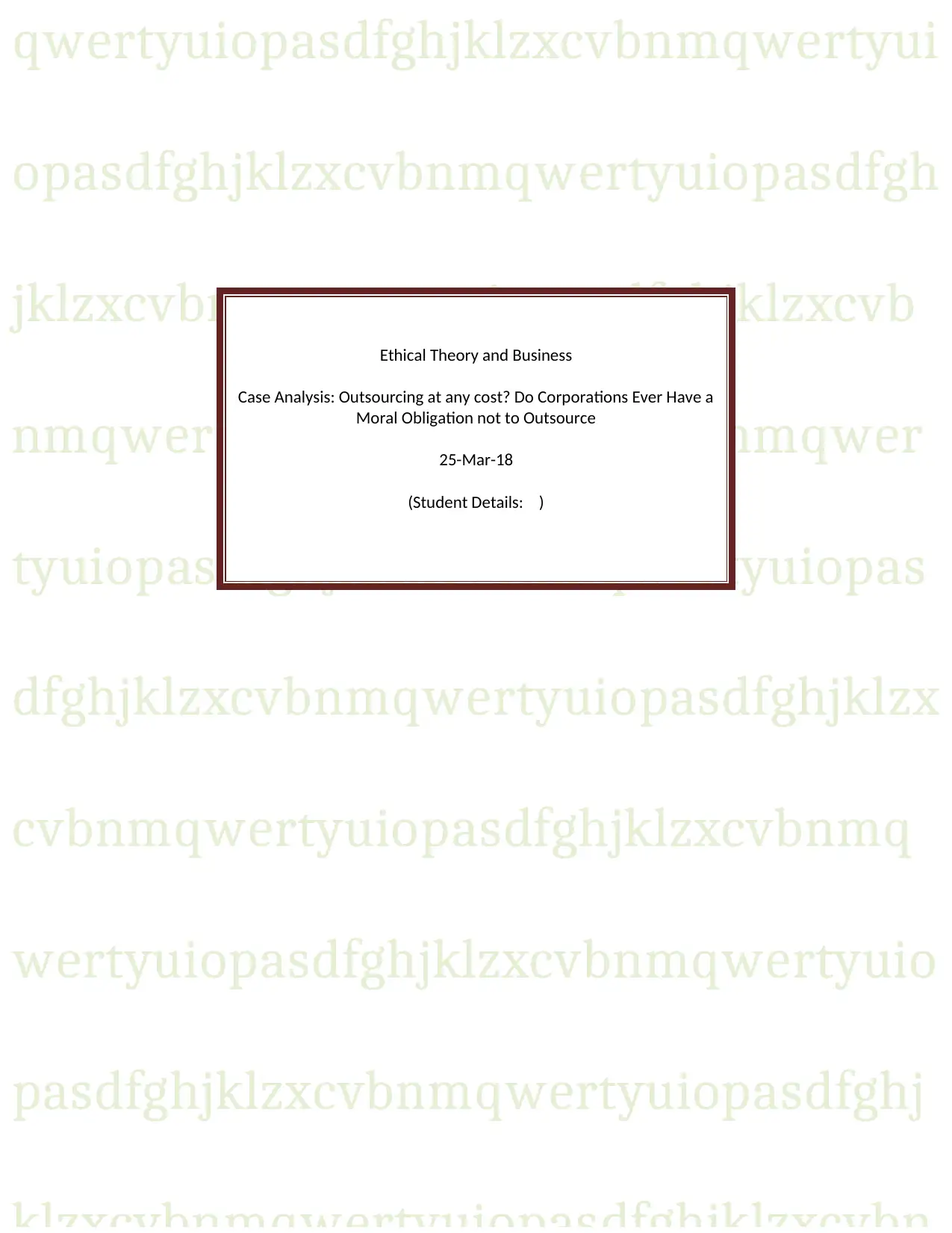
qwertyuiopasdfghjklzxcvbnmqwertyui
opasdfghjklzxcvbnmqwertyuiopasdfgh
jklzxcvbnmqwertyuiopasdfghjklzxcvb
nmqwertyuiopasdfghjklzxcvbnmqwer
tyuiopasdfghjklzxcvbnmqwertyuiopas
dfghjklzxcvbnmqwertyuiopasdfghjklzx
cvbnmqwertyuiopasdfghjklzxcvbnmq
wertyuiopasdfghjklzxcvbnmqwertyuio
pasdfghjklzxcvbnmqwertyuiopasdfghj
Ethical Theory and Business
Case Analysis: Outsourcing at any cost? Do Corporations Ever Have a
Moral Obligation not to Outsource
25-Mar-18
(Student Details: )
opasdfghjklzxcvbnmqwertyuiopasdfgh
jklzxcvbnmqwertyuiopasdfghjklzxcvb
nmqwertyuiopasdfghjklzxcvbnmqwer
tyuiopasdfghjklzxcvbnmqwertyuiopas
dfghjklzxcvbnmqwertyuiopasdfghjklzx
cvbnmqwertyuiopasdfghjklzxcvbnmq
wertyuiopasdfghjklzxcvbnmqwertyuio
pasdfghjklzxcvbnmqwertyuiopasdfghj
Ethical Theory and Business
Case Analysis: Outsourcing at any cost? Do Corporations Ever Have a
Moral Obligation not to Outsource
25-Mar-18
(Student Details: )
Paraphrase This Document
Need a fresh take? Get an instant paraphrase of this document with our AI Paraphraser
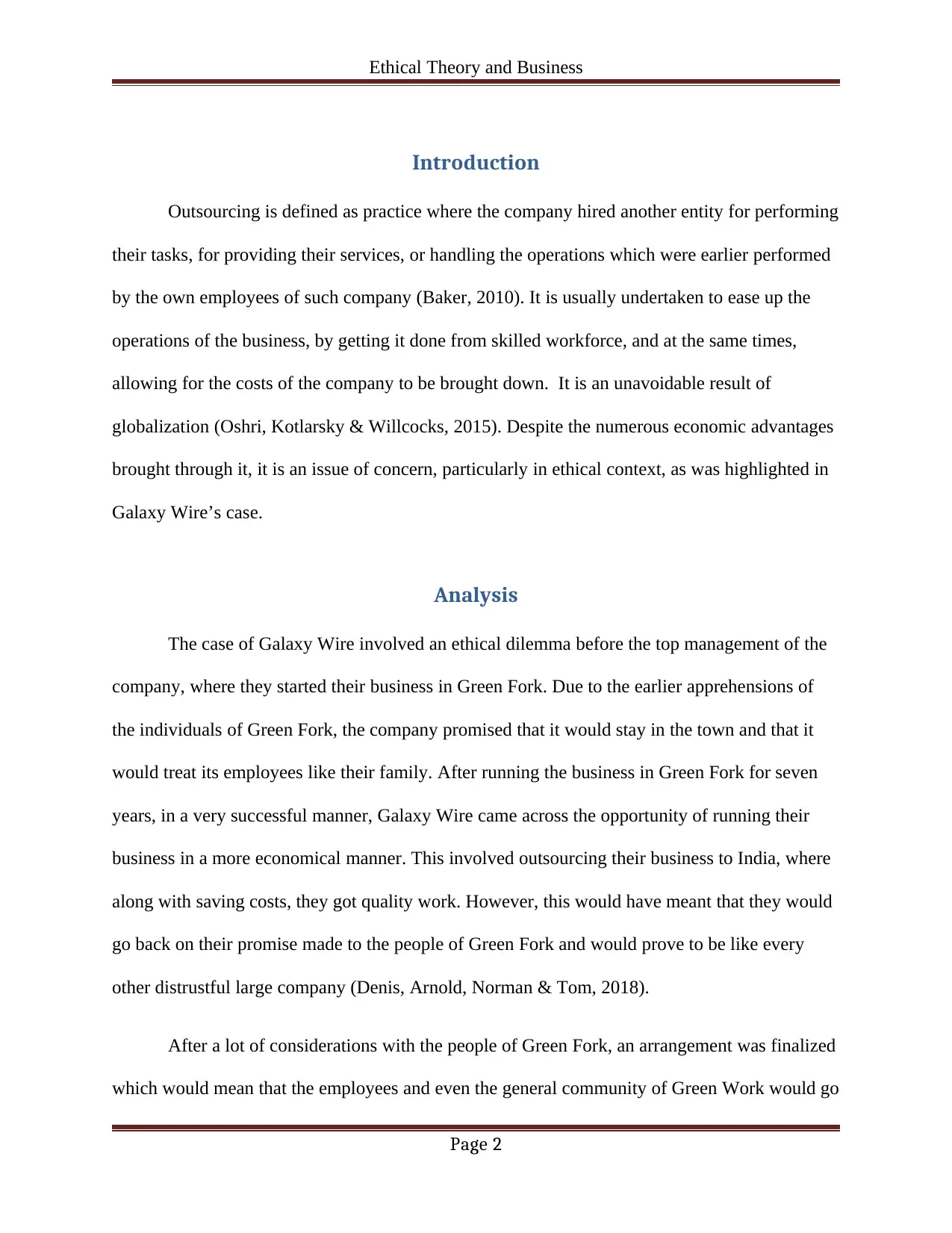
Ethical Theory and Business
Introduction
Outsourcing is defined as practice where the company hired another entity for performing
their tasks, for providing their services, or handling the operations which were earlier performed
by the own employees of such company (Baker, 2010). It is usually undertaken to ease up the
operations of the business, by getting it done from skilled workforce, and at the same times,
allowing for the costs of the company to be brought down. It is an unavoidable result of
globalization (Oshri, Kotlarsky & Willcocks, 2015). Despite the numerous economic advantages
brought through it, it is an issue of concern, particularly in ethical context, as was highlighted in
Galaxy Wire’s case.
Analysis
The case of Galaxy Wire involved an ethical dilemma before the top management of the
company, where they started their business in Green Fork. Due to the earlier apprehensions of
the individuals of Green Fork, the company promised that it would stay in the town and that it
would treat its employees like their family. After running the business in Green Fork for seven
years, in a very successful manner, Galaxy Wire came across the opportunity of running their
business in a more economical manner. This involved outsourcing their business to India, where
along with saving costs, they got quality work. However, this would have meant that they would
go back on their promise made to the people of Green Fork and would prove to be like every
other distrustful large company (Denis, Arnold, Norman & Tom, 2018).
After a lot of considerations with the people of Green Fork, an arrangement was finalized
which would mean that the employees and even the general community of Green Work would go
Page 2
Introduction
Outsourcing is defined as practice where the company hired another entity for performing
their tasks, for providing their services, or handling the operations which were earlier performed
by the own employees of such company (Baker, 2010). It is usually undertaken to ease up the
operations of the business, by getting it done from skilled workforce, and at the same times,
allowing for the costs of the company to be brought down. It is an unavoidable result of
globalization (Oshri, Kotlarsky & Willcocks, 2015). Despite the numerous economic advantages
brought through it, it is an issue of concern, particularly in ethical context, as was highlighted in
Galaxy Wire’s case.
Analysis
The case of Galaxy Wire involved an ethical dilemma before the top management of the
company, where they started their business in Green Fork. Due to the earlier apprehensions of
the individuals of Green Fork, the company promised that it would stay in the town and that it
would treat its employees like their family. After running the business in Green Fork for seven
years, in a very successful manner, Galaxy Wire came across the opportunity of running their
business in a more economical manner. This involved outsourcing their business to India, where
along with saving costs, they got quality work. However, this would have meant that they would
go back on their promise made to the people of Green Fork and would prove to be like every
other distrustful large company (Denis, Arnold, Norman & Tom, 2018).
After a lot of considerations with the people of Green Fork, an arrangement was finalized
which would mean that the employees and even the general community of Green Work would go
Page 2
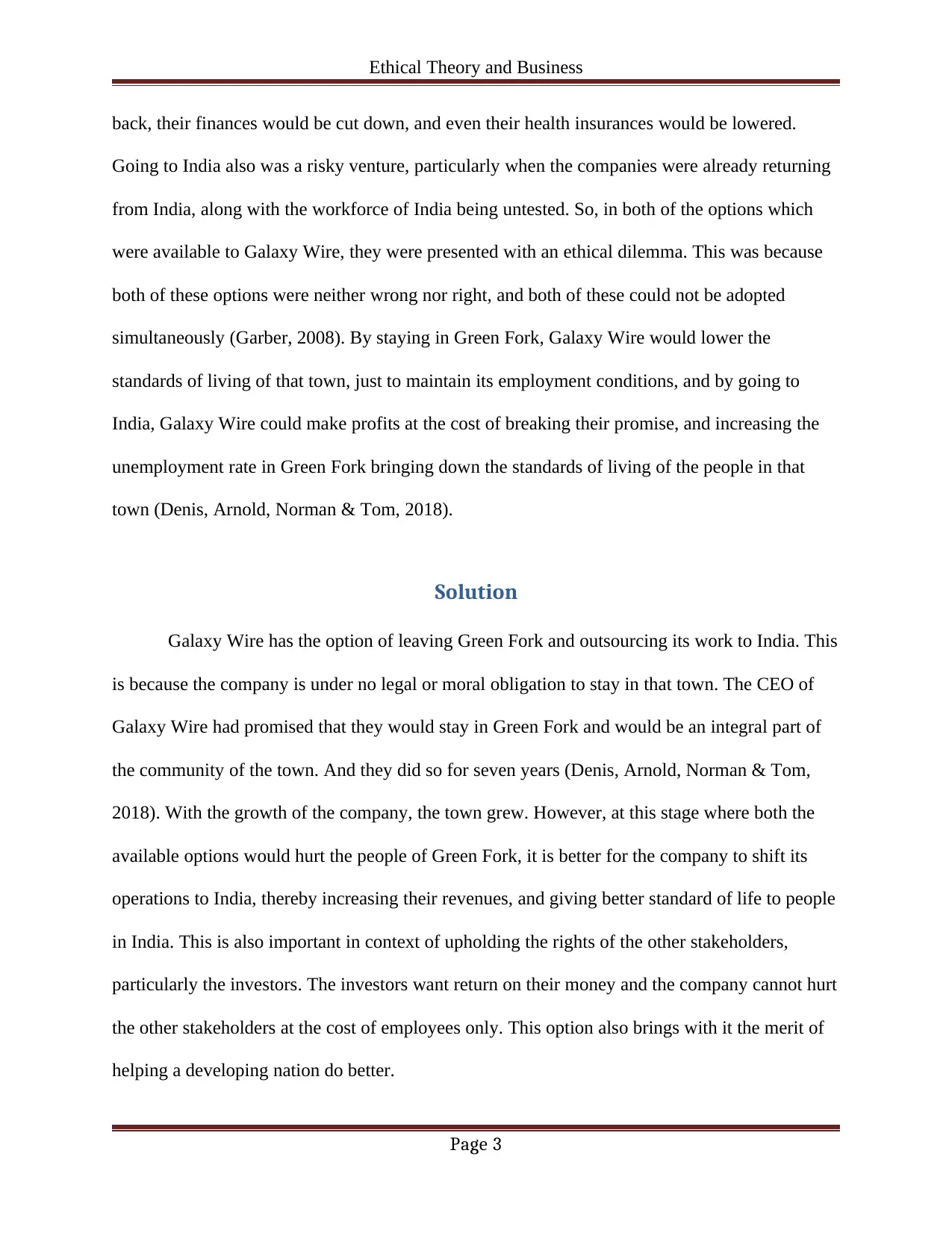
Ethical Theory and Business
back, their finances would be cut down, and even their health insurances would be lowered.
Going to India also was a risky venture, particularly when the companies were already returning
from India, along with the workforce of India being untested. So, in both of the options which
were available to Galaxy Wire, they were presented with an ethical dilemma. This was because
both of these options were neither wrong nor right, and both of these could not be adopted
simultaneously (Garber, 2008). By staying in Green Fork, Galaxy Wire would lower the
standards of living of that town, just to maintain its employment conditions, and by going to
India, Galaxy Wire could make profits at the cost of breaking their promise, and increasing the
unemployment rate in Green Fork bringing down the standards of living of the people in that
town (Denis, Arnold, Norman & Tom, 2018).
Solution
Galaxy Wire has the option of leaving Green Fork and outsourcing its work to India. This
is because the company is under no legal or moral obligation to stay in that town. The CEO of
Galaxy Wire had promised that they would stay in Green Fork and would be an integral part of
the community of the town. And they did so for seven years (Denis, Arnold, Norman & Tom,
2018). With the growth of the company, the town grew. However, at this stage where both the
available options would hurt the people of Green Fork, it is better for the company to shift its
operations to India, thereby increasing their revenues, and giving better standard of life to people
in India. This is also important in context of upholding the rights of the other stakeholders,
particularly the investors. The investors want return on their money and the company cannot hurt
the other stakeholders at the cost of employees only. This option also brings with it the merit of
helping a developing nation do better.
Page 3
back, their finances would be cut down, and even their health insurances would be lowered.
Going to India also was a risky venture, particularly when the companies were already returning
from India, along with the workforce of India being untested. So, in both of the options which
were available to Galaxy Wire, they were presented with an ethical dilemma. This was because
both of these options were neither wrong nor right, and both of these could not be adopted
simultaneously (Garber, 2008). By staying in Green Fork, Galaxy Wire would lower the
standards of living of that town, just to maintain its employment conditions, and by going to
India, Galaxy Wire could make profits at the cost of breaking their promise, and increasing the
unemployment rate in Green Fork bringing down the standards of living of the people in that
town (Denis, Arnold, Norman & Tom, 2018).
Solution
Galaxy Wire has the option of leaving Green Fork and outsourcing its work to India. This
is because the company is under no legal or moral obligation to stay in that town. The CEO of
Galaxy Wire had promised that they would stay in Green Fork and would be an integral part of
the community of the town. And they did so for seven years (Denis, Arnold, Norman & Tom,
2018). With the growth of the company, the town grew. However, at this stage where both the
available options would hurt the people of Green Fork, it is better for the company to shift its
operations to India, thereby increasing their revenues, and giving better standard of life to people
in India. This is also important in context of upholding the rights of the other stakeholders,
particularly the investors. The investors want return on their money and the company cannot hurt
the other stakeholders at the cost of employees only. This option also brings with it the merit of
helping a developing nation do better.
Page 3
⊘ This is a preview!⊘
Do you want full access?
Subscribe today to unlock all pages.

Trusted by 1+ million students worldwide
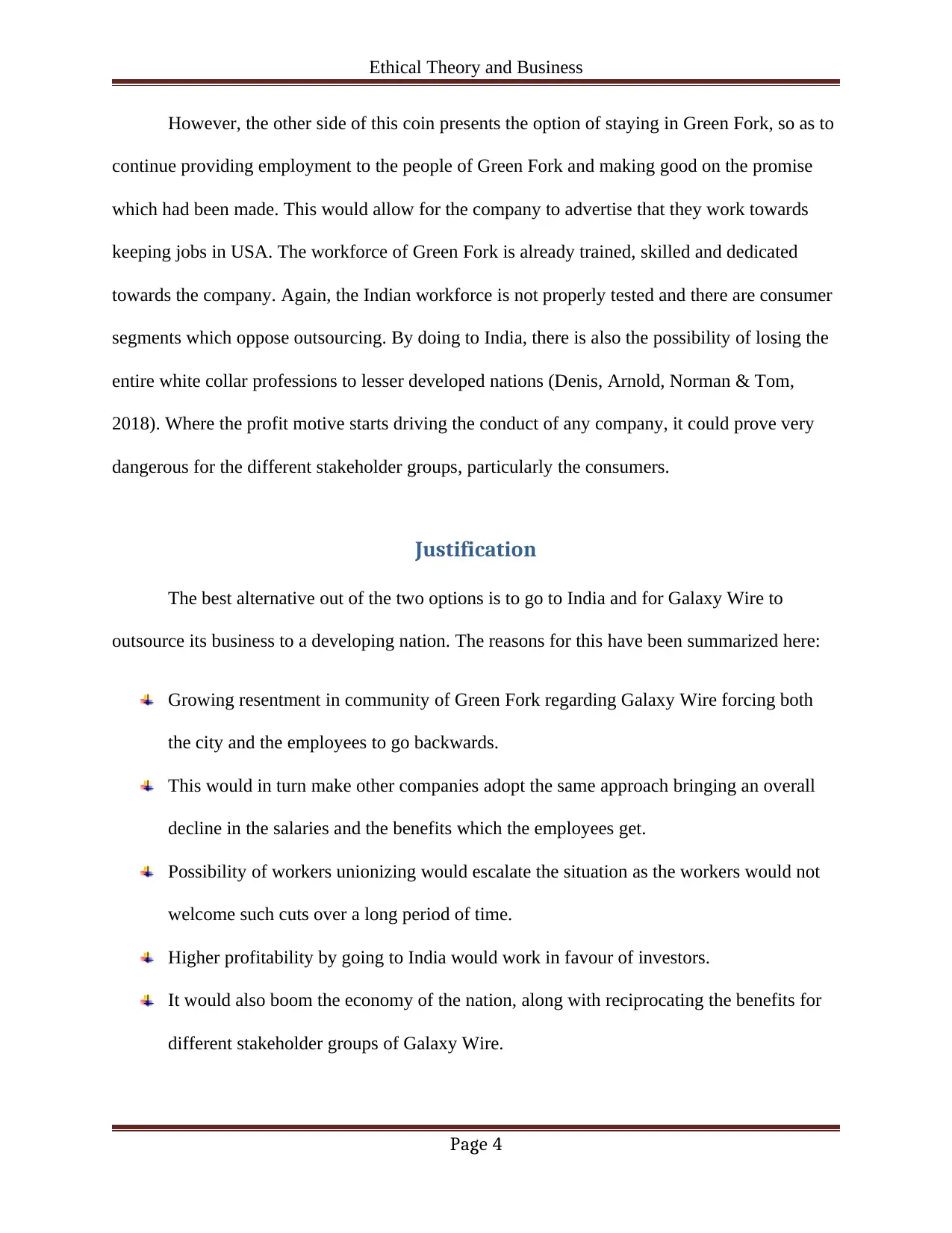
Ethical Theory and Business
However, the other side of this coin presents the option of staying in Green Fork, so as to
continue providing employment to the people of Green Fork and making good on the promise
which had been made. This would allow for the company to advertise that they work towards
keeping jobs in USA. The workforce of Green Fork is already trained, skilled and dedicated
towards the company. Again, the Indian workforce is not properly tested and there are consumer
segments which oppose outsourcing. By doing to India, there is also the possibility of losing the
entire white collar professions to lesser developed nations (Denis, Arnold, Norman & Tom,
2018). Where the profit motive starts driving the conduct of any company, it could prove very
dangerous for the different stakeholder groups, particularly the consumers.
Justification
The best alternative out of the two options is to go to India and for Galaxy Wire to
outsource its business to a developing nation. The reasons for this have been summarized here:
Growing resentment in community of Green Fork regarding Galaxy Wire forcing both
the city and the employees to go backwards.
This would in turn make other companies adopt the same approach bringing an overall
decline in the salaries and the benefits which the employees get.
Possibility of workers unionizing would escalate the situation as the workers would not
welcome such cuts over a long period of time.
Higher profitability by going to India would work in favour of investors.
It would also boom the economy of the nation, along with reciprocating the benefits for
different stakeholder groups of Galaxy Wire.
Page 4
However, the other side of this coin presents the option of staying in Green Fork, so as to
continue providing employment to the people of Green Fork and making good on the promise
which had been made. This would allow for the company to advertise that they work towards
keeping jobs in USA. The workforce of Green Fork is already trained, skilled and dedicated
towards the company. Again, the Indian workforce is not properly tested and there are consumer
segments which oppose outsourcing. By doing to India, there is also the possibility of losing the
entire white collar professions to lesser developed nations (Denis, Arnold, Norman & Tom,
2018). Where the profit motive starts driving the conduct of any company, it could prove very
dangerous for the different stakeholder groups, particularly the consumers.
Justification
The best alternative out of the two options is to go to India and for Galaxy Wire to
outsource its business to a developing nation. The reasons for this have been summarized here:
Growing resentment in community of Green Fork regarding Galaxy Wire forcing both
the city and the employees to go backwards.
This would in turn make other companies adopt the same approach bringing an overall
decline in the salaries and the benefits which the employees get.
Possibility of workers unionizing would escalate the situation as the workers would not
welcome such cuts over a long period of time.
Higher profitability by going to India would work in favour of investors.
It would also boom the economy of the nation, along with reciprocating the benefits for
different stakeholder groups of Galaxy Wire.
Page 4
Paraphrase This Document
Need a fresh take? Get an instant paraphrase of this document with our AI Paraphraser
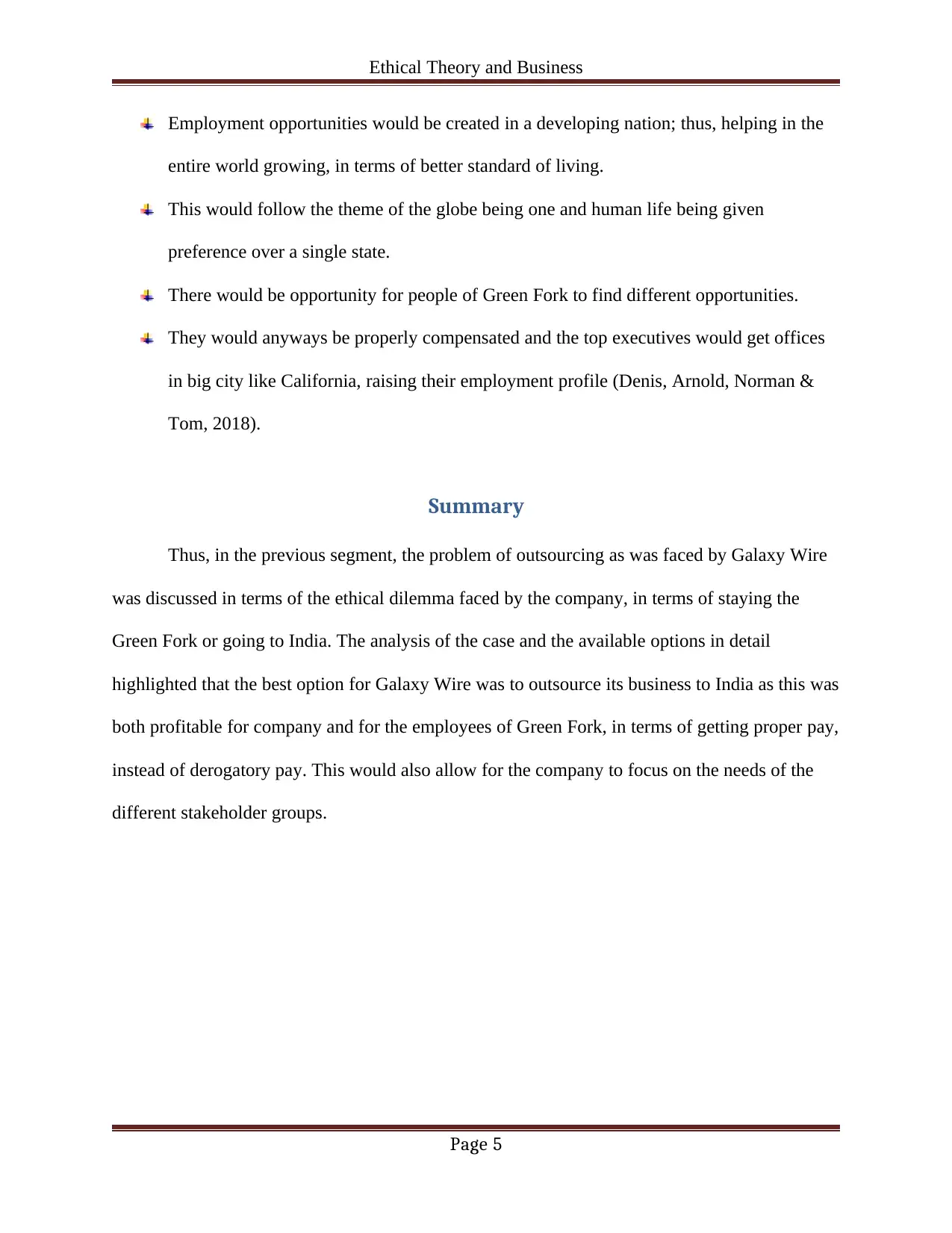
Ethical Theory and Business
Employment opportunities would be created in a developing nation; thus, helping in the
entire world growing, in terms of better standard of living.
This would follow the theme of the globe being one and human life being given
preference over a single state.
There would be opportunity for people of Green Fork to find different opportunities.
They would anyways be properly compensated and the top executives would get offices
in big city like California, raising their employment profile (Denis, Arnold, Norman &
Tom, 2018).
Summary
Thus, in the previous segment, the problem of outsourcing as was faced by Galaxy Wire
was discussed in terms of the ethical dilemma faced by the company, in terms of staying the
Green Fork or going to India. The analysis of the case and the available options in detail
highlighted that the best option for Galaxy Wire was to outsource its business to India as this was
both profitable for company and for the employees of Green Fork, in terms of getting proper pay,
instead of derogatory pay. This would also allow for the company to focus on the needs of the
different stakeholder groups.
Page 5
Employment opportunities would be created in a developing nation; thus, helping in the
entire world growing, in terms of better standard of living.
This would follow the theme of the globe being one and human life being given
preference over a single state.
There would be opportunity for people of Green Fork to find different opportunities.
They would anyways be properly compensated and the top executives would get offices
in big city like California, raising their employment profile (Denis, Arnold, Norman &
Tom, 2018).
Summary
Thus, in the previous segment, the problem of outsourcing as was faced by Galaxy Wire
was discussed in terms of the ethical dilemma faced by the company, in terms of staying the
Green Fork or going to India. The analysis of the case and the available options in detail
highlighted that the best option for Galaxy Wire was to outsource its business to India as this was
both profitable for company and for the employees of Green Fork, in terms of getting proper pay,
instead of derogatory pay. This would also allow for the company to focus on the needs of the
different stakeholder groups.
Page 5
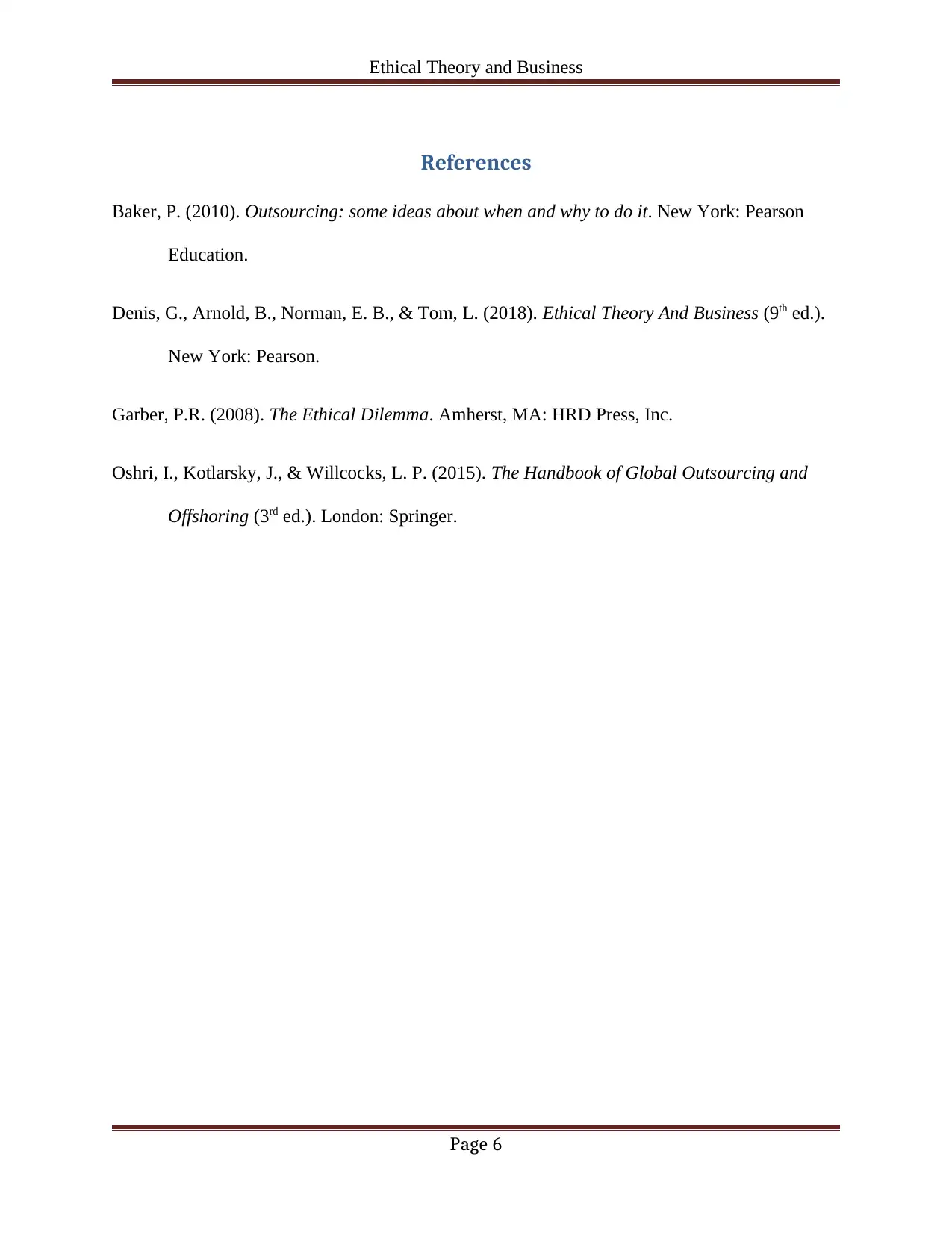
Ethical Theory and Business
References
Baker, P. (2010). Outsourcing: some ideas about when and why to do it. New York: Pearson
Education.
Denis, G., Arnold, B., Norman, E. B., & Tom, L. (2018). Ethical Theory And Business (9th ed.).
New York: Pearson.
Garber, P.R. (2008). The Ethical Dilemma. Amherst, MA: HRD Press, Inc.
Oshri, I., Kotlarsky, J., & Willcocks, L. P. (2015). The Handbook of Global Outsourcing and
Offshoring (3rd ed.). London: Springer.
Page 6
References
Baker, P. (2010). Outsourcing: some ideas about when and why to do it. New York: Pearson
Education.
Denis, G., Arnold, B., Norman, E. B., & Tom, L. (2018). Ethical Theory And Business (9th ed.).
New York: Pearson.
Garber, P.R. (2008). The Ethical Dilemma. Amherst, MA: HRD Press, Inc.
Oshri, I., Kotlarsky, J., & Willcocks, L. P. (2015). The Handbook of Global Outsourcing and
Offshoring (3rd ed.). London: Springer.
Page 6
⊘ This is a preview!⊘
Do you want full access?
Subscribe today to unlock all pages.

Trusted by 1+ million students worldwide
1 out of 6
Your All-in-One AI-Powered Toolkit for Academic Success.
+13062052269
info@desklib.com
Available 24*7 on WhatsApp / Email
![[object Object]](/_next/static/media/star-bottom.7253800d.svg)
Unlock your academic potential
Copyright © 2020–2025 A2Z Services. All Rights Reserved. Developed and managed by ZUCOL.
